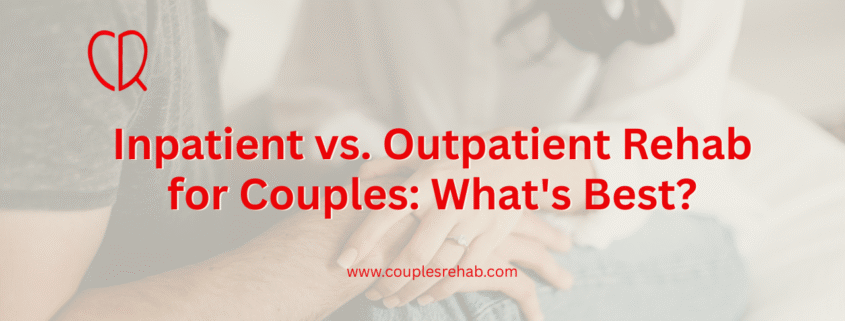When addiction affects a relationship, both partners need healing. Inpatient vs. outpatient rehab for couples represents one of the most critical decisions in your recovery journey, as the path to recovery becomes even more complex when couples face substance abuse together.
Understanding the differences between inpatient vs. outpatient rehab for couples is essential for making informed treatment decisions. This comprehensive guide explores every aspect of couples rehab dual diagnosis inpatient vs outpatient options, helping you choose the right approach that supports both your individual healing and relationship restoration.
Understanding Couples Addiction Treatment: The Foundation of Recovery
Couples addiction treatment recognizes that substance abuse doesn’t occur in isolation. When one or both partners struggle with addiction, the relationship itself becomes both a casualty and a potential catalyst for recovery.
Traditional individual treatment often overlooks relationship dynamics. Couples Rehab specializes in addressing these interconnected challenges through evidence-based approaches that treat both partners simultaneously.
The Unique Challenges Couples Face in Recovery
Recovery becomes more complicated when relationships are involved. Partners may:
- Enable each other’s addictive behaviors
- Share triggers and environments that promote substance use
- Experience codependency issues that complicate treatment
- Face communication breakdowns that hinder progress
- Struggle with trust and intimacy damaged by addiction
These challenges require specialized intervention that standard individual treatment programs cannot adequately address.
Inpatient Rehab for Couples: Comprehensive Residential Treatment
Inpatient rehabilitation provides the highest level of care for couples struggling with severe addiction. This intensive approach removes couples from their everyday environment, providing 24/7 medical supervision and comprehensive therapeutic support.
What Makes Inpatient Treatment Unique for Couples
Residential treatment for couples creates a controlled, supportive environment where both partners can focus entirely on recovery without external distractions or triggers.
The best residential treatment for couples alcohol abuse typically includes:
- 24/7 Medical Supervision: Continuous monitoring ensures safety during detoxification and early recovery phases
- Intensive Daily Therapy: Multiple individual and couples therapy sessions address both personal and relationship issues
- Structured Environment: Elimination of external stressors allows complete focus on healing
- Peer Support: Connection with other couples facing similar challenges provides invaluable support
- Comprehensive Assessment: Thorough evaluation of both addiction and relationship dynamics
Medical Detoxification for Couples
Many couples require medically supervised detoxification before beginning therapy. Inpatient facilities provide:
Safe withdrawal management with 24/7 medical monitoring, medication-assisted treatment when appropriate, and emotional support during the challenging detox period.
The presence of a partner during detox can provide emotional comfort while ensuring both individuals receive necessary medical attention.
Therapeutic Components of Inpatient Couples Treatment
Residential programs offer comprehensive therapeutic approaches including:
Individual Therapy Sessions: Each partner works with dedicated therapists to address personal trauma, mental health issues, and addiction triggers.
Couples Therapy Sessions: Joint sessions focus on communication skills, rebuilding trust, and developing healthy relationship patterns.
Group Therapy: Participation in group sessions with other couples provides perspective and reduces isolation.
Family Therapy: When appropriate, family members participate in therapy to rebuild damaged relationships and create support systems.
Duration and Intensity of Inpatient Treatment
Most inpatient programs for couples range from 30 to 90 days, with some extended programs lasting up to six months.
The intensive nature of residential treatment means couples typically engage in 6-8 hours of therapy daily, combined with educational workshops, recreational activities, and peer support meetings.
Outpatient Rehab for Couples: Flexible Treatment While Maintaining Daily Life
Outpatient treatment allows couples to receive professional addiction treatment while maintaining their work, family, and social responsibilities. This approach offers various levels of intensity to match different needs and circumstances.
Types of Outpatient Programs for Couples
Standard Outpatient Programs (OP): Typically involve 1-3 sessions per week, allowing maximum flexibility for couples with work and family obligations.
Intensive Outpatient Programs (IOP): Require 9-12 hours of treatment per week, usually scheduled during evenings or weekends to accommodate work schedules.
Partial Hospitalization Programs (PHP): Provide 20-30 hours of treatment per week while allowing couples to return home each evening.
Benefits of Virtual Intensive Outpatient Program for Couples
Technology has revolutionized addiction treatment, making high-quality care more accessible than ever. Virtual IOP programs offer:
Convenience and Accessibility: Couples can participate from home, eliminating transportation barriers and reducing scheduling conflicts.
Reduced Stigma: Some couples feel more comfortable seeking treatment from the privacy of their homes.
Continuity of Care: Geographic limitations don’t prevent access to specialized couples treatment.
Cost-Effectiveness: Virtual programs often cost less than traditional in-person treatment while maintaining therapeutic quality.
Couples Rehab offers cutting-edge virtual IOP programs that maintain the same therapeutic intensity as in-person treatment while providing unprecedented flexibility.
How to Choose Outpatient Rehab for Couples with Children
Parents in recovery face unique challenges that require specialized consideration. When selecting outpatient treatment:
Consider childcare availability during treatment hours. Many programs offer evening or weekend sessions to accommodate parenting responsibilities.
Evaluate family-inclusive approaches that help parents maintain their roles while pursuing recovery.
Assess the impact on children and seek programs that provide family therapy or support services for children affected by parental addiction.
Look for flexible scheduling that allows parents to maintain school pickup, activities, and family routines.
Couples Rehab understands the complexities of parenting during recovery and offers specialized programs designed to support families throughout the treatment process.
Cost of Couples Intensive Outpatient Program Addiction Treatment
Financial considerations play a significant role in treatment decisions. Understanding the cost structure helps couples make informed choices about their recovery investment.
Factors Affecting Treatment Costs
Program Duration: Longer programs typically cost more but may provide better long-term outcomes.
Level of Care: Intensive programs with more therapeutic hours cost more than standard outpatient treatment.
Additional Services: Specialized services like dual diagnosis treatment, family therapy, or medication management increase costs.
Location and Facility: Treatment centers in different areas have varying cost structures.
Private Couples Rehab vs Insurance Covered Options
Private Pay Advantages:
- Greater treatment flexibility and customization
- Access to luxury amenities and private accommodations
- Shorter wait times for admission
- Extended treatment durations when needed
Insurance Coverage Benefits:
- Significant cost reduction for eligible couples
- Access to quality treatment regardless of financial situation
- Coverage for extended care and aftercare services
Couples Rehab works with most major insurance providers and offers transparent pricing for private pay options. Our financial counselors help couples understand their coverage and explore payment options that make treatment accessible.
Dual Diagnosis Treatment: Addressing Mental Health and Addiction Together
Many individuals struggling with addiction also have co-occurring mental health conditions. Couples rehab dual diagnosis inpatient vs outpatient treatment addresses these complex, interconnected issues.
Common Dual Diagnosis Conditions in Couples
Depression and Anxiety: These conditions often contribute to substance abuse and complicate recovery.
PTSD and Trauma: Past trauma may drive addiction and affect relationship dynamics.
Bipolar Disorder: Mood swings can trigger substance use and relationship conflicts.
Personality Disorders: These conditions require specialized therapeutic approaches alongside addiction treatment.
Integrated Treatment Approaches
Effective dual diagnosis treatment integrates mental health and addiction services rather than treating them separately.
Medication Management: Psychiatric medications may be necessary to stabilize mental health conditions while addressing addiction.
Specialized Therapy: Trauma-informed care, cognitive-behavioral therapy, and dialectical behavior therapy address both conditions simultaneously.
Coordinated Care: Mental health professionals and addiction specialists work together to create comprehensive treatment plans.
Couples Therapy During Drug Rehab Pros and Cons
Integrating couples therapy into addiction treatment offers significant benefits but also presents potential challenges.
Advantages of Couples Therapy During Rehab
Addresses Relationship Triggers: Many couples find that relationship conflicts trigger substance use, making joint therapy essential.
Improves Communication: Addiction often damages communication patterns that need repair during recovery.
Builds Mutual Support: Couples learn to support each other’s recovery rather than enabling destructive behaviors.
Prevents Relapse: Strong relationships provide protection against relapse and promote long-term sobriety.
Potential Challenges and Considerations
Individual Focus May Suffer: Some individuals need to address personal issues before engaging in couples work.
Conflict Escalation: Early recovery can be emotionally volatile, potentially intensifying relationship conflicts.
Codependency Issues: Couples therapy must address unhealthy relationship dynamics that contribute to addiction.
Different Recovery Timelines: Partners may progress at different rates, creating relationship tension.
Couples Rehab’s experienced therapists carefully assess each couple’s readiness for joint therapy and provide individual support when needed.
Marriage Counseling Options During Outpatient Addiction Treatment
Recovery offers an opportunity to rebuild and strengthen marriages damaged by addiction. Various counseling approaches support this process.
Evidence-Based Couples Therapy Modalities
Emotionally Focused Therapy (EFT): Helps couples understand and change negative interaction patterns while building emotional connection.
Gottman Method: Uses research-based interventions to improve communication, manage conflict, and build intimacy.
Behavioral Couples Therapy (BCT): Specifically designed for couples affected by addiction, focusing on communication skills and relapse prevention.
Cognitive-Behavioral Couples Therapy: Addresses thought patterns and behaviors that contribute to both addiction and relationship problems.
Integrating Marriage Counseling with Addiction Treatment
Successful integration requires:
Coordinated Treatment Planning: Marriage counselors and addiction specialists collaborate to ensure consistent therapeutic goals.
Timing Considerations: Some couples benefit from focusing on individual recovery before intensive couples work.
Relapse Prevention Integration: Marriage counseling incorporates addiction recovery principles and relapse prevention strategies.
Communication Skills Development: Couples learn healthy communication patterns that support both recovery and relationship health.
Couples Support Groups for Addiction Recovery Near Me
Peer support plays a crucial role in sustaining long-term recovery. Support groups provide ongoing encouragement and practical guidance from couples who understand the unique challenges of recovery.
Types of Couples Support Groups
12-Step Programs: Couples for Couples Recovery and similar programs adapt traditional 12-step principles for couples in recovery.
Non-12-Step Alternatives: SMART Recovery and other evidence-based programs offer different approaches to peer support.
Online Support Communities: Virtual support groups provide access to peer support regardless of location or schedule constraints.
Specialized Groups: Some groups focus on specific issues like dual diagnosis, trauma, or parenting in recovery.
Benefits of Ongoing Peer Support
Reduced Isolation: Connection with other couples reduces the isolation often experienced in early recovery.
Practical Guidance: Experienced couples share strategies for managing triggers, conflicts, and relationship challenges.
Accountability: Regular group participation provides natural accountability for recovery commitments.
Hope and Inspiration: Seeing other couples succeed in recovery provides hope during difficult periods.
Couples Rehab facilitates connections with local and online support groups, ensuring couples have ongoing peer support throughout their recovery journey.
Aftercare Planning for Couples After Inpatient Rehab
The transition from inpatient treatment back to daily life represents a critical period requiring careful planning and ongoing support.
Components of Comprehensive Aftercare
Continued Therapy: Regular individual and couples therapy sessions maintain therapeutic progress and address new challenges.
Medication Management: Ongoing psychiatric care ensures mental health stability during the transition.
Support Group Participation: Regular attendance at support groups provides peer support and accountability.
Recovery Monitoring: Some couples benefit from regular check-ins with treatment professionals or recovery coaches.
Addressing Common Aftercare Challenges
Environmental Triggers: Returning to previous environments may expose couples to triggers that weren’t present during residential treatment.
Relationship Stressors: Daily life stressors test the relationship skills learned during treatment.
Work and Family Pressures: Balancing recovery priorities with work and family responsibilities requires ongoing support.
Relapse Prevention: Developing and practicing relapse prevention strategies becomes crucial during the transition period.
Couples Rehab provides comprehensive aftercare planning that begins during initial treatment and continues for as long as couples need support.

Making the Right Choice: Factors to Consider
Selecting between inpatient and outpatient treatment requires careful consideration of multiple factors unique to each couple’s situation.
Severity of Addiction
Inpatient treatment is typically recommended for:
- Severe physical dependence requiring medical detox
- Multiple failed attempts at outpatient treatment
- Co-occurring severe mental health conditions
- High-risk situations or environments
Outpatient treatment may be appropriate for:
- Milder addiction without severe physical dependence
- Strong motivation and family support systems
- Ability to maintain abstinence between sessions
- Work or family responsibilities that cannot be interrupted
Relationship Dynamics and Safety
Some relationships involve domestic violence, severe conflict, or other safety concerns that affect treatment recommendations.
Professional assessment helps determine whether couples can safely participate in joint treatment or need individual treatment initially.
Support System Availability
Strong family and social support can make outpatient treatment more effective, while couples with limited support may benefit more from the comprehensive support provided in residential treatment.
Financial Considerations and Insurance Coverage
Treatment costs and insurance coverage significantly impact treatment decisions. Couples Rehab’s financial counselors help couples understand their options and identify the most appropriate and accessible treatment approach.
The Role of Family in Couples Recovery
Family members often play crucial roles in both addiction development and recovery success. Comprehensive treatment addresses these family dynamics.
Family Involvement in Treatment
Family Therapy Sessions: Include parents, children, and siblings in the recovery process when appropriate.
Education Programs: Help family members understand addiction and learn how to support recovery effectively.
Boundary Setting: Teach family members to set healthy boundaries that support rather than enable addiction.
Communication Skills: Improve family communication patterns that may have contributed to addiction or hindered recovery.
Supporting Children During Parental Recovery
Children of parents in recovery need special attention and support throughout the treatment process.
Age-Appropriate Education: Help children understand addiction and recovery in ways they can comprehend.
Emotional Support: Provide counseling and support groups specifically designed for children affected by parental addiction.
Stability and Routine: Maintain consistency in children’s lives during parental treatment.
Safety Planning: Ensure children’s safety and well-being throughout the recovery process.
Technology and Innovation in Couples Addiction Treatment
Modern addiction treatment incorporates technology to improve accessibility, engagement, and outcomes.
Digital Therapeutic Tools
Mobile Apps: Recovery apps help couples track progress, manage triggers, and maintain connection with treatment teams.
Virtual Reality Therapy: Some programs use VR technology to practice coping skills in simulated environments.
Biometric Monitoring: Wearable devices can monitor stress levels and other indicators that might predict relapse risk.
Online Resources: Educational materials, guided meditations, and skill-building exercises supplement traditional therapy.
Telemedicine Integration
Remote Consultations: Technology allows for more frequent check-ins with treatment professionals.
Crisis Intervention: 24/7 access to support through technology platforms provides immediate assistance during difficult moments.
Medication Monitoring: Remote monitoring ensures medication compliance and identifies potential issues early.
Measuring Success in Couples Recovery
Recovery success involves multiple dimensions beyond simply abstaining from substances.
Individual Recovery Metrics
Sobriety Duration: Length of continuous abstinence from substances.
Mental Health Stability: Improvement in depression, anxiety, and other mental health conditions.
Physical Health: Recovery of physical health damaged by substance abuse.
Life Skills: Development of healthy coping mechanisms and life management skills.
Relationship Recovery Indicators
Communication Quality: Improvement in how couples communicate about difficult topics.
Trust Rebuilding: Progress in reestablishing trust damaged by addiction.
Intimacy Restoration: Recovery of emotional and physical intimacy.
Conflict Resolution: Development of healthy ways to manage disagreements and challenges.
Long-Term Recovery Sustainability
Relapse Prevention: Effectiveness of strategies to prevent return to substance use.
Support System Strength: Quality and reliability of ongoing support networks.
Life Satisfaction: Overall improvement in quality of life and relationship satisfaction.
Goal Achievement: Progress toward personal and relationship goals established during treatment.
Frequently Asked Questions About Couples Rehab
How long does couples rehab typically take?
Treatment duration varies based on individual needs and program type. Inpatient programs typically last 30-90 days, while outpatient treatment may continue for several months to over a year. The key is finding the right duration to establish solid recovery foundations.
Can couples with different addictions be treated together?
Yes, couples with different substance abuse patterns can participate in treatment together. Treatment plans are individualized to address each person’s specific addiction while working on relationship dynamics that affect both partners.
What happens if only one partner is ready for treatment?
When only one partner is ready for treatment, individual therapy can begin while working to engage the reluctant partner. Family interventions and motivational approaches may help encourage participation from both partners.
Is couples therapy effective during early recovery?
Couples therapy can be highly effective during recovery, but timing is important. Some individuals need to focus on personal recovery initially before engaging in intensive couples work. Professional assessment determines the best approach for each couple.
How do we maintain privacy during couples treatment?
Reputable treatment centers maintain strict confidentiality policies. Information is only shared with consent, and couples can discuss privacy preferences with their treatment team to ensure comfort and compliance with legal requirements.
What if we relapse during treatment?
Relapse is common during recovery and doesn’t mean treatment failure. Treatment teams are experienced in helping couples navigate relapse, adjust treatment plans, and get back on track toward recovery goals.
Taking the Next Step: Getting Started with Couples Rehab
Recovery begins with a single step, and choosing the right treatment approach can make all the difference in your journey toward healing and relationship restoration.
Couples Rehab provides comprehensive assessment and personalized treatment recommendations to help couples choose between inpatient and outpatient options. Our experienced team understands the complexities of addiction’s impact on relationships and offers evidence-based solutions that address both individual and couple recovery needs.
What to Expect During Your Initial Assessment
Comprehensive Evaluation: Detailed assessment of addiction severity, mental health status, and relationship dynamics.
Treatment Recommendations: Professional guidance on the most appropriate level of care and treatment approach.
Insurance Verification: Assistance understanding insurance coverage and payment options.
Treatment Planning: Development of personalized treatment goals and timelines.
Recovery is possible, and relationships can heal. The choice between inpatient vs. outpatient rehab for couples depends on your unique circumstances, but both paths can lead to lasting recovery and relationship restoration.
Your journey toward healing starts today. Contact Couples Rehab to begin your comprehensive assessment and take the first step toward reclaiming your relationship and your life from addiction’s grip.
Recovery isn’t just about stopping substance use—it’s about rebuilding lives, restoring relationships, and creating a foundation for lasting happiness together. Whether you choose inpatient or outpatient treatment, Couples Rehab provides the expertise, support, and hope needed to transform your recovery journey into a success story.
Don’t wait for addiction to cause more damage to your relationship. Take action today and discover how the right treatment approach can help you and your partner build a stronger, healthier future together.



